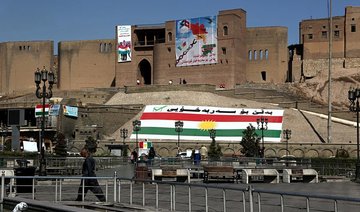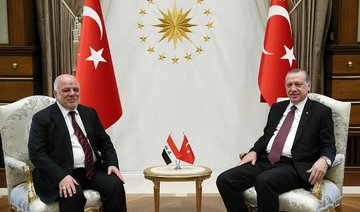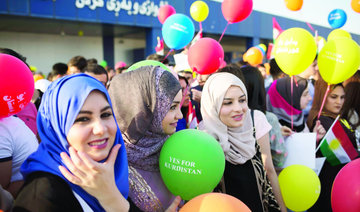ANKARA: The Turkish government is gearing up to play a mediating role between the Iraqi central government and the Kurdish Regional Government (KRG) in Irbil to resolve their post-referendum dispute.
The mediation proposal was announced by Turkish Foreign Minister Mevlut Cavusoglu on Wednesday at the state-run Anadolu Agency Editors’ Desk in Ankara.
“There are some requests (to Turkey) to mediate (between Irbil and Baghdad). I will go to Baghdad on Jan. 21. We will discuss this in addition to the bilateral issues, and our desire is to overcome these problems as soon as possible in the framework of Iraq’s territorial integrity,” he said.
Turkey has always voiced its opposition to the independence referendum that was held by the KRG on Sept. 25 last year, but it did not close its land border with the region despite calls from Baghdad.
In the first two weeks of December, KRG high-level officials visited France and Germany by taking the overland route through Turkey, and then taking a flight from there to discuss the deadlock on Irbil-Baghdad relations.
The statement follows an announcement by Iraqi Prime Minister Haider Al-Abadi on Tuesday at a news conference in Baghdad, which said that Iraq remains committed to its cooperation in various areas with Turkey, including border management, bilateral trade relations and oil shipments, especially from Mosul and Kirkuk.
According to official figures, the trade volume between Turkey and Iraq is currently around $8 billion, $2.5 billion of which is with northern Iraq. Much of this trade is conducted through the Habur border crossing whose control was recently handed over to Baghdad at Turkey’s initiative.
The construction of an oil pipeline to export Iraqi oil from Kirkuk area via Turkey’s Ceyhan port, on Turkey’s eastern Mediterranean coast, is also expected to be completed soon.
Experts think that Turkey, as a neutral actor that has resilient and longstanding ties with the two sides, is in a unique position to mediate between Baghdad and Irbil to resolve the crisis.
Bilgay Duman, an expert on Iraqi affairs at Ankara-based think tank ORSAM, said Ankara has always supported the dialogue process within Iraq, and considered both sides as complementary to each other, rather than being alternative.
“Turkey wants stability at its doorstep. It saw any independence attempt of Irbil as a red line and always supported Iraq’s stability and territorial integrity,” Duman told Arab News.
According to Duman, any continuing instability might allow the outlawed Kurdistan Workers’ Party (PKK) based in northern Iraq to fill a power vacuum in the territories near the Turkish border.
It is not the first time Ankara has played a mediation role in Iraq, especially considering its key geographic position for the transit of oil.
“It acted before as a key facilitator between Irbil and Baghdad between 2013-2015 for regulating the profits from oil exports and helping them to reach to an agreement,” Duman said.
On Jan. 4, KRG’s Prime Minister Nechirvan Barzani met with the new Turkish Consul General to Irbil, Hakan Karacay, who expressed Ankara’s readiness to help mend Irbil-Baghdad ties.
“Irbil faces widespread anti-government protests mainly due to the deteriorating economic conditions, while Baghdad wants to overcome all bilateral problems and solely concentrate on the upcoming local and general elections due to be held on May 12,” Duman said.
However, Duman thinks that any rapprochement between Baghdad and Irbil will contribute to the political, social and economic rights of Turkmens in Iraq who have been badly hurt by this crisis.
Turkey is interested in the Turkmen population in Iraq due to its ethnic, linguistic, religious, cultural and historical ties.
According to Muhanad Seloom, director of the Iraqi Center for Strategic Studies in London, Ankara has the capability to act as a mediator for several reasons.
“It is true that Turkey has vested interests in countering the rise of Kurdish ethno-nationalist aspirations, yet, Turkey has played a significant role in helping the KRG develop its economic and financial infrastructures,” Seloom told Arab News.
He explained that although Baghdad-Ankara relations were strained prior and during the war against Daesh due to differences over local and regional policies, especially in Iraq and Syria, the relations took a positive turn last October with the visit of the Iraqi premier to Ankara to discuss post-referendum actions with Ankara.
“During this visit, the two sides agreed to coordinate efforts to preserve the territorial integrity of Iraq and regional stability,” Seloom said.
Seloom thinks that for Turkey, playing a mediating role between Baghdad and Irbil will be very useful on many levels.
“Despite differences with the KRG over holding the independence referendum, the Turkish government relations with the KRG have not been completely destroyed due to deeply rooted financial and economic ties,” he said.
“For example, the KRG used to sell oil through Turkish ports and revenues were handled by financial institutions based in Turkey. Prior to the current crisis, Turkish companies were the main winners of KRG’s construction and services contracts,” he said.
Equally, Seloom thinks that the Turkish government wants to establish stronger economic ties with Baghdad by playing a role in resolving the crisis between Baghdad and Irbil.
“It is also important to note that the Turkish government seeks to counterbalance Iran’s increasing influence in Iraq. While Iran is dealing with its internal unrest, Turkey sees an opportunity to seize,” he said.
Turkey to mediate between KRG and Baghdad
Turkey to mediate between KRG and Baghdad

Lebanon’s new president says to visit Saudi Arabia on first official trip

- Lebanese leader tells crown prince that ‘Saudi Arabia would be the first destination in his visits abroad’
BEIRUT: Lebanon’s newly-elected president, Joseph Aoun, will visit Saudi Arabia following an invitation from Saudi Crown Prince Mohammed bin Salman, according to a statement posted on the Lebanese presidency’s X account on Saturday.
ولي العهد السعودي وجه دعوة للرئيس عون لزيارة المملكة. ورئيس الجمهورية اكد ان المملكة العربية السعودية ستكون اول مقصد له في زياراته الخارجية تلبية لدعوة سمو ولي العهد وايمانا بدور المملكة التاريخي في مساندة لبنان والتعاضد معه وتاكيدا لعمق لبنان العربي كاساس لعلاقات لبنان مع محيطه
— Lebanese Presidency (@LBpresidency) January 11, 2025
Prince Mohammed has congratulated Aoun, during a phone call, on his election and conveyed to him the congratulations of Saudi King Salman.
The Crown Prince also expressed his sincere congratulations and hopes for success to Aoun and the people of Lebanon, with wishes for further progress and prosperity.
Aoun told the crown prince that “Saudi Arabia would be the first destination in his visits abroad,” it said, after the Saudi prince called to congratulate him on taking office on Thursday following a two-year vacancy in the position.
The statement did not specify a date for the visit.
Aoun, 61, was elected as the country’s 14th president by parliamentarians during a second round of voting on Thursday, breaking a 26-month deadlock over the position.
In his speech after taking his oath of office before parliament, he said that the country was entering a new phase.
The Mediterranean country has been without a president since the term of Michel Aoun – not related – ended in October 2022, with tensions between the Iran-backed Hezbollah movement and its opponents scuppering a dozen previous votes.
Syrian intelligence says it foiled Daesh attempt to target Damascus shrine

- Sayyida Zeinab has been the site of past attacks on Shiite pilgrims by Daesh
DAMASCUS: Intelligence officials in Syria’s new de facto government thwarted a plan by the Daesh group to set off a bomb at a Shiite shrine in the Damascus suburb of Sayyida Zeinab, state media reported Saturday.
State news agency SANA reported, citing an unnamed official in the General Intelligence Service, that members of the Daesh cell planning the attack were arrested. It quoted the official as saying that the intelligence service is “putting all its capabilities to stand in the face of all attempts to target the Syrian people in all their spectrums.”
Sayyida Zeinab has been the site of past attacks on Shiite pilgrims by Daesh — which takes an extreme interpretation of Sunni Islam and considers Shiites to be infidels.
In 2023, a motorcycle planted with explosives detonated in Sayyida Zeinab, killing at least six people and wounding dozens a day before the Shiite holy day of Ashoura.
The announcement that the attack had been thwarted appeared to be another attempt by the country’s new leaders to reassure religious minorities, including those seen as having been supporters of the former government of Bashar Assad.
Assad, a member of the Alawite minority, was allied with Iran and with the Shiite Lebanese militant group Hezbollah as well as Iranian-backed Iraqi militias.
Hayat Tahrir Al-Sham, or HTS, the former insurgent group that led the lightning offensive that toppled Assad last month and is now the de facto ruling party in the country, is a Sunni Islamist group that formerly had ties with Al-Qaeda.
The group later split from Al-Qaeda, and HTS leader Ahmad Al-Sharaa has preached religious coexistence since assuming power in Damascus.
Also Saturday, Lebanon’s caretaker Prime Minister Najib Mikati arrived in Damascus to meet with Al-Sharaa.
Relations between the two countries had been strained under Assad, with Lebanon’s political factions deeply divided between those supporting and opposing Assad’s rule.
Lebanon PM visits Damascus on first such trip since before Syria war

- Najib Mikati is expected to hold talks with Syria’s new leader Ahmed Al-Sharaa
DAMASCUS: Lebanese Prime Minister Najib Mikati arrived in Damascus Saturday in the first such visit since before civil war broke out in Syria in 2011, an AFP journalist reported.
His visit comes as the neighboring countries seek better relations after Islamist-led militants toppled longtime strongman Bashar Assad last month.
He is expected to hold talks with Syria’s new leader Ahmed Al-Sharaa.
The visit comes days after Lebanese lawmakers elected the country’s army chief Joseph Aoun as president, ending a more than two-year vacancy.
Deadlock between pro- and anti-Hezbollah blocs in parliament had scuppered a dozen previous attempts to fill the vacancy but the Shiite militant group emerged weakened from two months of full-fledged war with Israel late last year.
Syria was the dominant power in Lebanon for three decades under the Assad clan but withdrew its troops in 2005 in the face of international pressure over the assassination of Lebanese ex-prime minister Rafic Hariri.
Israel strikes Yemen Houthis, warns it will ‘hunt’ leaders

- Israeli military said fighter jets struck military targets belonging to Houthi regime
- It said it also struck military infrastructure in the ports of Hodeida and Ras Issa
JERUSALEM: Israel struck Houthi targets in Yemen on Friday, including a power station and coastal ports, in response to missile and drone launches, and warned it would hunt down the group’s leaders.
“A short while ago... fighter jets struck military targets belonging to the Houthi terrorist regime on the western coast and inland Yemen,” the Israeli military said in a statement.
It said the strikes were carried out in retaliation for Houthi missile and drone launches into Israel.
The statement said the targets included “military infrastructure sites in the Hizaz power station, which serves as a central source of energy” for the Houthis.
It said it also struck military infrastructure in the ports of Hodeida and Ras Issa.
Israeli Prime Minister Benjamin Netanyahu, in a statement after the strikes, said the Houthis were being punished for their repeated attacks on his country.
“As we promised, the Houthis are paying, and they will continue to pay, a heavy price for their aggression against us,” he said.
Israeli Defense Minister Israel Katz said Israel would “hunt down the leaders of the Houthi terror organization.”
“The Hodeida port is paralyzed, and the Ras Issa port is on fire — there will be no immunity for anyone,” he said in a video statement.
The Houthis, who control Sanaa, have fired missiles and drones toward Israel since war broke out in Gaza in October 2023.
They describe the attacks as acts of solidarity with Gazans.
The Iran-backed rebels have also targeted ships in the Red Sea and Gulf of Aden, prompting retaliatory strikes by the United States and, on occasion, Britain.
Israel has also struck Houthi targets in Yemen, including in the capital.
Since the Gaza war began, the Houthis have launched about 40 surface-to-surface missiles toward Israel, most of which were intercepted, the Israeli army says.
The military has also reported the launch of about 320 drones, with more than 100 intercepted by Israeli air defenses.
West Bank family wants justice for children killed in Israel strike

- Israeli troops or settlers have killed at least 825 Palestinians in the territory, according to Health Ministry figures
TAMMUN, Plestinian Territories: Batoul Bsharat was playing with her eight-year-old brother Reda in their village in the occupied West Bank. Moments later, an Israeli drone strike killed him and two of their cousins.
“It was the first time in our lives that we played without arguing. It meant so much to me,” the 10-year-old said as she sat on the concrete ledge outside the family home in the northern village of Tammun where they had been playing on Wednesday.
At her feet, a crater no wider than two fists marked where the missile hit.
The wall behind her is pockmarked with shrapnel impacts, and streaks of blood still stain the ledge.
Besides Reda, Hamza, 10, and Adam, 23, were also killed.
The Israeli army said on Wednesday that it had struck “a terrorist cell” in Tammun but later promised an investigation into the civilian deaths.
Batoul puts on a brave face but is heartbroken at the loss of her younger brother.
“Just before he was martyred, he started kissing and hugging me,” she said.
“I miss my brother so much. He was the best thing in the world.”
Her cousin Obay, 16, brother of Adam, was the first to come out and find the bodies before Israeli soldiers came to take them away.
“I went outside and saw the three of them lying on the ground,” he said. “I tried to lift them, but the army came and didn’t allow us to get close.”
Obay said his elder brother had just returned from a pilgrimage to Makkah.
“Adam and I were like best friends. We had so many shared moments together. Now I can’t sleep,” he said, staring into the distance, bags under his eyes.
Obay said the soldiers made him lie on the ground while they searched the house and confiscated cellphones before leaving with the bodies on stretchers.
Later on Wednesday, the army returned the bodies, which were then laid to rest. On Thursday, Obay’s father, Khaireddin, and his brothers received condolences from neighbors.
Despite his pain, he said things could have been worse as the family home hosts many children.
“Usually, about six or seven kids are playing together, so if the missile had struck when they were all there, it could have been 10 children,” he said.
Khaireddin was at work at a quarry in the Jordan Valley when he heard the news. Adam had chosen to stay home and rest after his pilgrimage to Makkah.
He described his son as “an exceptional young man, respectful, well-mannered and upright,” who had “nothing to do with any resistance or armed groups.”
Khaireddin, like the rest of the Bsharat family, said he could not comprehend why his home had been targeted.
“We are a simple family, living ordinary lives. We have no affiliations with any sides or movements.”
Violence has soared in the West Bank since war broke out in Gaza with the Hamas attack of Oct. 7, 2023.
Israeli troops or settlers have killed at least 825 Palestinians in the territory, according to Health Ministry figures.
As the Israeli army has stepped up its raids on West Bank cities and refugee camps, it has also intensified its use of air strikes, which were once a rarity.
A day before the Bsharat home was hit, a similar strike had struck Tammun.
Khaireddin regrets that the army made “no apology or acknowledgment of their mistake.”
“This is the current reality — there is no accountability. Who can we turn to for justice?“




















